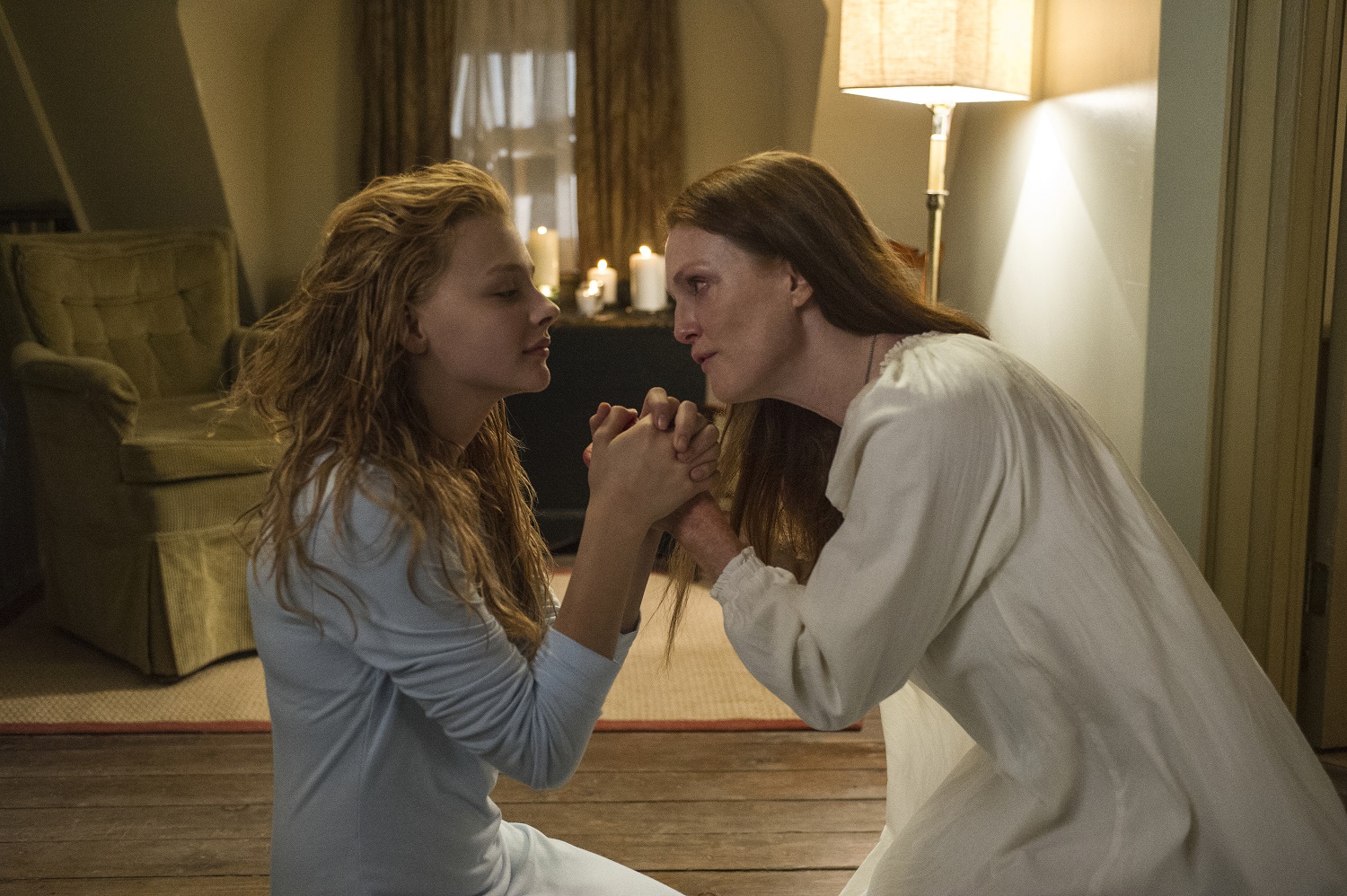
This guest post by Al Rosenberg appears as part of our theme week on Bad Mothers.
Of course, it being a horror movie based on a Stephen King novel, the outcome is not so simple as a terrifying “religious cleansing.” When Carrie and Margaret finally have a heart-to-heart it’s the biproduct of the telekinetic teenager having just murdered a good percentage of her high school. Margaret cannot suffer to let this witch live, and attempts to end her daughter’s life, a final act of ultimate control, and ends up on the wrong end of Carrie’s new found powers.
Movies have been curious about this maternal tension since the get-go. While Carrie may have had the super skills, all three of these mothers have very realistic power over their offspring. In Now, Voyager (1942), Bette Davis plays rich, mousey Charlotte Vale, a woman whose life is entirely dictated by her mother (Gladys Cooper). Mrs. Vale does not push Charlotte into closets, or chant biblical passages at her. In fact, this matriarch barely moves throughout the film. Instead, Charlotte’s life is controlled through her mother’s emotional manipulation. Like Carrie, Charlotte was an unwanted child and Mrs. Vale makes sure she knows it. She tells Charlotte what to wear, how to talk, whom to associate with, all in the name of ladylike propriety.

Through therapy and travel Davis’s character finds her own voice (and was a babe-in-disguise, perhaps one of the earliest films in that trope as well). When the two women meet again they’re at a stalemate. What is a controlling mother without a child to control? Mrs. Vale’s demise is more similar to Margaret White’s than one might expect from a “weepie” film, finally leaving Charlotte to be her own woman.
Hollywood would like us to believe that this kind of parent is just one bad turn away in everyday life. And maybe that’s true: Mommie Dearest is based on the memoirs of Joan Crawford’s (Bette Davis’s biggest rival) daughter. It’s the tale of Joan Crawford (Faye Dunaway) tormenting her adopted daughter Christina in bizarre, abusive ways. Again an unwanted child, but this time not by her mother. Though Joan chose Christina, it becomes clear that it was all an act, like much of Crawford’s life in this film.

Eventually Christina makes it onto the big screen herself, perhaps due to years of her mother’s ambition being shoved down her throat. But when she’s too ill to make it to set, Joan, a much older woman, takes the role from her. Joan doesn’t join Margaret White and Mrs. Vale in the Killed-By-Our-Daughters afterlife, but Christina did wait until after the death of her mother to publish these memoirs and, hopefully, find some resolution.

These films were just the start of audiences’ obsession with controlling mothers. We continue to see these tropes replayed in a multitude of ways. Carrie (1976) was recently remade for the second time, Carrie (2014). Though this time it offered a slightly more sympathetic view of both mother and daughter. Audiences may not have loved it as much as the first attempt, but it was still the Halloween pick for many movie-goers.

Mommie Dearest’s fame-driven mother finds a spiritual successor in Natalie Portman’s mother in Black Swan (2010). Portman is driven to the brink of insanity by her own ambition, but couple that with her mother’s drive and it’s just too much for the young ballerina. You can also watch moms incredibly similar to Crawford and her drive for success in any of the many seasons of Dance Moms available on Lifetime. Or watch the beginning of “no more wire hanger” relationships in Little Miss Perfect, and, my personal favorite, Toddlers & Tiaras. Audiences seem to love to hate the controlling pageant mom.
Mothers are important, they guide children through life in a multitude of ways, but some children get stuck with the women who never wanted them. Perhaps these mothers, raped, or widowed, or abandoned, see too much of themselves in their daughters and push too hard. Perhaps the real life version of these mothers deserve more of our sympathy than to be turned into monsters of the big screen in a multitude of ways. But these three mean moms? Maybe they got the ends they deserved.
Al Rosenberg is the Games Section Editor of WomenWriteAboutComics.com, a reviewer at Lesbrary.com, a Chicagoan, and a general nuisance. Follow on Twitter: @sportsmyballs

